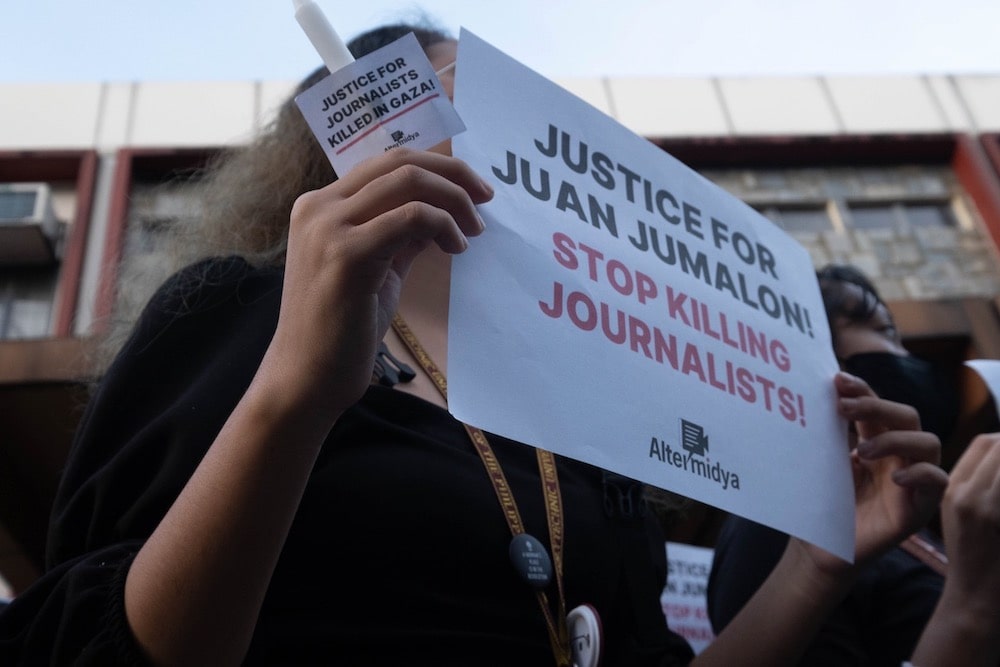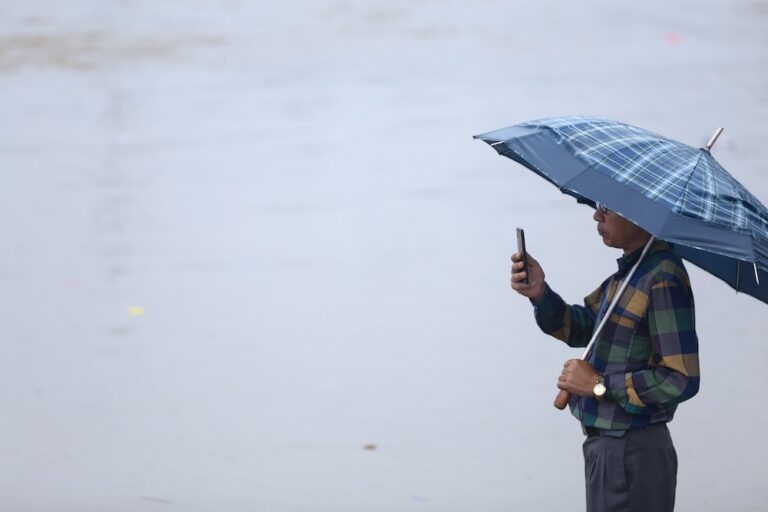November 2023 in Asia-Pacific: A free expression round up produced by IFEX's regional editor Mong Palatino, based on IFEX member reports and news from the region.
Killing with impunity in the Philippines, India’s biggest data breach, Nepal bans TikTok, mass crackdown in Bangladesh, and new initiatives in Pakistan address gendered disinformation and cyber harassment.
Impunity undermines media freedom and democracy
The brazen killing of Filipino radio host Juan Jumalon during a live broadcast inside his home studio on 5 November showed how impunity continues to threaten the safety and security of journalists in the Philippines. He was the fourth journalist killed under the government of Ferdinand Marcos Jr., who became president on 30 June 2022. Over the past year, the National Union of Journalists of the Philippines has documented 101 attacks against the media, including cases of extrajudicial killings, harassment, death threats, denial of coverage, online intimidation, censorship, and the filing of cyber libel and libel charges.
The killing of Jumalon took place a few weeks before the anniversary of the 2009 Ampatuan massacre, whose victims included 32 journalists. IFEX member Center for Media Freedom and Responsibility summarised the status of the 14-year-old case and called for continued vigilance.
“Only 117 of 197 accused were tried; 44 were convicted. 80 others are yet to be sentenced; of which 75, still at large. Convictions can still be overturned in the process of an appeal. Constant vigilance is needed.”
In China, citizen journalist and activist Sun Lin was killed after reportedly being beaten by the police inside his home. Prior to the incident, he had been sharing social media videos about anti-Xi Jinping protests during the Asia-Pacific Economic Cooperation summit in San Francisco.
“This gruesome murder is a direct consequence of the Chinese regime’s paranoia, which leads its leaders to see an enemy of the state in every independent media or journalist, and therefore exposes them to systematic retribution.”
Cédric Alviani, RSF Asia-Pacific bureau director
An important takeaway from these impunity cases is that ensuring the safety of journalists is essential to strengthen accountability in a democracy. This is especially crucial during an election period since voters and the public in general need access to verified information. Concerned over the state of impunity ahead of the January 2024 elections, Pakistan Press Foundation has called on the Pakistan government to create an “open, restriction-free, and safe environment” in order for the media to effectively fulfill their work.
India’s biggest data breach
IFEX member SFLC.in urged authorities in India to investigate and provide the public with adequate information about the reported data breach involving the Indian Council of Medial Research (ICMR). The reported leak of COVID-19 test details affected 815 million registered users of ICMR. SFLC.in warned that the country’s biggest data breach “underscores the risks associated with centralized data collection, especially when it involves sensitive information.”
On a related privacy concern, SFLC.in also called for an independent probe into the notification sent by Apple that the phones of several opposition legislators and critical journalists were targeted by state-sponsored attackers. SFLC.in noted that the “weaponization of such spyware to quell dissent” undermines democracy.
Nepal bans TikTok
The decision of authorities in Nepal to ban popular social media platform TikTok was criticized by civil society groups and digital rights advocates who described the action as “untimely and arbitrary” and said that it “seriously attacks the basic principles of democracy, weakens civil liberties, and undermines the rule of law.”
In a signed statement, they added that “by banning TikTok blanketly, the government’s intention appears to be to block a platform of communication and expression, limiting the opportunities of Nepalese citizens to engage in online conversations, share their views, and participate in the global digital community.”
IFEX member Freedom Forum also called out the government for issuing a new directive intended to regulate social networking sites. It also assailed a government order prohibiting public assemblies in Kathmandu Valley – Maitighar Mandal for 27 days in an apparent attempt to prevent the opposition from staging protests in the area.
“Non-transparent measure of Tiktok regulation and prohibitory order on public spaces have direct impact on citizens’ rights of free speech and freedom of assembly and association, which are against the constitution and democratic norms,” said Freedom Forum’s Executive Chief Taranath Dahal.
Bangladesh: Ten thousand activists arrested since 28 October
In Bangladesh, a massive protest organized by the opposition on 28 October led to violent clashes with the police and members of the ruling party. In response, protesters called for a three-day strike, which was also violently dispersed by security forces. It was followed by a mass crackdown targeting members and leaders of the main opposition party. At least 10,000 opposition activists have been arrested and a bigger number face politically-motivated charges. During the protest, almost 30 journalists were attacked by the protesters, members of the ruling party, and the police.
The escalating violence reflects the political crisis ahead of the January 2024 general election. Human Rights Watch (HRW) underscored the need to uphold freedom of expression in order to realize a free and fair electoral process.
“A free election is impossible when the government stifles free expression and systematically incapacitates the opposition, critics, and activists through arbitrary arrests, enforced disappearance, harassment, and intimidation,” said Julia Bleckner, senior Asia researcher at HRW
In brief: Country reports by IFEX members
In Malaysia, the Centre for Independent Journalism (CIJ) reviewed the reform agenda of the Anwar Ibrahim government, which came to power a year ago. CIJ acknowledged several laudable initiatives of the government, such as the legislation endorsing the people’s right to information and the preparation for the establishment of a media council. But it also highlighted the continued use of repressive laws like the Sedition Act to suppress free speech.
In Cambodia, the latest report of the Cambodian Center for Human Rights, which covered the period between September 2022 and August 2023, pointed out that the government “continued its worrying trend of over-policing free speech and silencing critical voices, a repression that was exacerbated ahead of the July 2023 general election.” It monitored how state officials filed legal actions against 16 journalists and 100 human rights defenders. It also documented the license revocation of five independent media outlets.
In Sri Lanka, Free Media Movement recorded 88 press freedom incidents and violations during the first seven months of the year. Most of the cases pertain to the safety, security, and legal challenges faced by journalists.
In Afghanistan, the Afghanistan Journalists Center documented a total of 75 incidents violating media freedom from March to November this year. It urged the Taliban “to revise their media policy, refrain from imposing unjustified and extra-legal demands on journalists and media, and provide an environment to work without fear and free from self-censorship.”
In China, a year has passed since the White Paper protests, which saw thousands of citizens gathering in urban centers to condemn the harsh COVID-19 policies and lockdown measures of the government. Yaqiu Wang of Freedom House wrote about how authorities suppressed attempts to commemorate the movement. “Words and names associated with the protests continue to be banned online, protest sites are cordoned off by police, and those who participated in 2022 still face police harassment.”
New and noteworthy from the Digital Rights Foundation
IFEX member Digital Rights Foundation (DRF) has unveiled several initiatives promoting digital rights, women empowerment, and gender equity in Pakistan.
- It relaunched “Ab Aur Nahin”, an online legal and counselor support service designed for survivors of harassment. It connects women to pro bono lawyers who are ready to assist in cases involving gender-based violence.
- It signed a Memorandum of Understanding with the Deputy Commissioner of the Lahore District Administration to collaborate on a series of digital safety and literacy sessions for young adults.
- It announced the release of a Disinformation WhatsApp Tipline enjoining the public to document and report instances of gendered disinformation.
- DRF’s feminist e-magazine 50/50 has a new edition themed “Election Illusions: Deepfakes & Disinformation in Pakistan”, which explores the impact of AI and its ethical use ahead of the 2024 elections.
- Finally, it published a series of animated videos on social media depicting the stories of individuals facing online harassment. Meet Aiza, a 14-year-old student who is constantly harassed; Kumar, who is trolled because of his political beliefs and religion; and Laila, a Trans Tiktoker who shared her experience in fighting cyber harassment.



